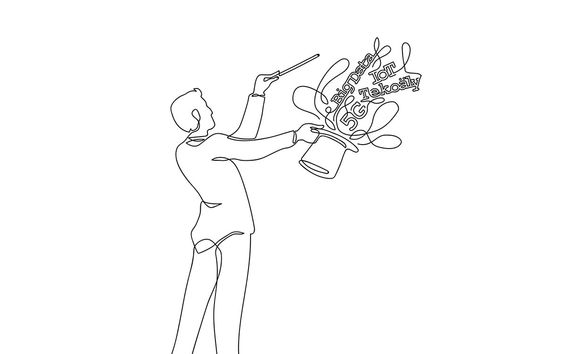Digitalisation did not increase productivity as expected - researchers propose solutions for increasing productivity

Big data, the Internet of Things (IoT), the Industrial Internet and Industry 4.0 and later, 5G and artificial intelligence were presented as drivers of productivity, and experts predicted that the productivity of industry and services will increase significantly thanks to digitalisation. For example, Accenture predicted that artificial intelligence alone would provide an annual 2% rise in value added potential in Finland.
In reality, huge sector-specific differences are seen in growth leaps.
"Although the productivity of work in Finnish industry has improved by 22 per cent over the past decade, the increase in the production of machinery and equipment has been just 4 per cent in ten years and 8 per cent in construction," says Research Professor Heikki Ailisto from VTT Technical Research Centre of Finland. On the other hand, productivity has increased in the information and communication sectors by 38% and in the financial and insurance sector by 35%. The differences between companies in the same sector are also extensive.
The productivity benefits of digitalisation vary dramatically by sector
The Digital Disruption of Industry Consortium has researched the impact of digitalisation on Finnish society. Researchers found that the differences in productivity within sectors can be explained as follows:
- The information, communication and financial sector are pioneers in the utilisation of digitalisation that have been able to increase their productivity. International studies confirm the view that these differences are due to the ability of different sectors to utilise digitalisation: Banking operations are easier to digitalise than a construction site. A report published by the OECD classifies the information and financing sectors are those that are furthest in overall digitalisation. The utilisation of digitalisation is also essential for the competitiveness of companies in these sectors, as the sectors are also subject to international competition and their competitors utilise digitalisation.
- As a whole, construction and the manufacture of machinery and equipment are not at the forefront of digitalisation, even though many companies have already done a great deal in this respect. In its report, the OECD classifies construction as a low-digitalisation sector. Construction is a typical domestic sector in which international competition does not create any pressure to increase efficiency. Labour costs in the labour-intensive construction sector have been influenced by the entry of cheap foreign labour into the market, which has reduced the pressure to develop productivity.
- Although the manufacturing industry has engaged in automation for numerous decades and in the 2010s, the Industrial Internet and investments in Industry 4.0 were expected to significantly improve productivity, the sector is no more than average in digitalisation, according to assessments by the OECD and McKinsey.
Productivity development will determine Finland's future well-being
Increasing the amount of work done in society, for example, by increasing the employment rate or immigration, will certainly increase the GDP. However, growth in the employment rate will likely occur in low-productivity sectors and may even require government subsidies, for example in the form of wage subsidies. In other words, the net impact on central government revenue will be small or, at worst, negative.
The development of Finland's well-being and Finland’s prosperity will depend on the ability of industry and other sectors to get the same amount of work done with less labour, especially as the population ages. For this reason, increasing the productivity of work is a necessity. Productivity increases by increasing the value of production, i.e. the value of a product or service, or by improving production efficiency. Digitalisation can have an impact on both. The value of the product to the customer may increase, for example, by integrating services produced with digitalisation into the product. On the other hand, the increase of efficiency is often achieved by integrating digitalisation into the production process to streamline it or by automating routines.
"The time is now ripe for the digitalisation of the manufacturing industry and construction, and through this for increasing productivity," emphasises Professor of Practice Timo Seppälä from Aalto University.
Researchers recommend that decision-makers undertake the following measures to increase productivity:
- Analyse projects financed with public funds that have aimed at promoting digitalisation from the perspective of productivity development. The Government’s analysis, assessment and research activities are a good means for the implementation of an impartial analysis.
- The launch of development and research projects that will aim at an increase in efficiency in manufacturing industry and the construction sector through digitalisation utilising the lessons learned from the analyses completed by means of the first recommendation.
- Develop digital features and services that increase the value of products in research and development projects to increase the value of manufacturing and construction products.
As digitalisation requires new skills, in particular continuing education that will focus on teaching digitalisation and skills for the use, application and implementation of new technologies also to those already in working life.
The policy brief is available in Finnish. You can view and download it from below.
Contact
Heikki Ailisto
Research Professor, VTT
heikki.ailisto@vtt.fi
+358 40 555 0726
Kari Hiekkanen
Research Fellow, Aalto University
kari.hiekkanen@aalto.fi
+358 50 573 0389
Read more news

Apply Now: Unite! Visiting Professorships at TU Graz
TU Graz, Austria, invites experienced postdoctoral researchers to apply for two fully funded visiting professorships. The deadline for expressions of interest is 20 February 2026, and the positions will begin on 1 October 2026.
Hanaholmen’s 50th anniversary exhibition lives on online – making the history of Finnish–Swedish cooperation accessible worldwide
MeMo Institute at Aalto University has produced a virtual 3D version of the anniversary exhibition of Hanaholmen.Soil Laboratory Exhibition – Exploring the Dialogue Between Human and the Earth in Utsjoki
Soil Laboratory explores the relationship between humans and the earth as a living landscape through ceramic practices in Utsjoki.






